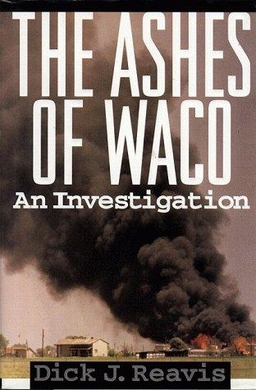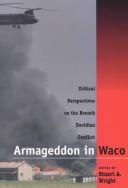
The Branch Davidians are an apocalyptic cult founded in 1955 by Benjamin Roden. They regard themselves as a continuation of the General Association of Davidian Seventh-Day Adventists, established by Victor Houteff in 1935.

The Waco siege, also known as the Waco massacre, was the siege by U.S. federal government and Texas state law enforcement officials of a compound belonging to the religious cult known as the Branch Davidians between February 28 and April 19, 1993. The Branch Davidians, led by David Koresh, were headquartered at Mount Carmel Center ranch in unincorporated McLennan County, Texas, 13 miles northeast of Waco. Suspecting the group of stockpiling illegal weapons, the Bureau of Alcohol, Tobacco, and Firearms (ATF) obtained a search warrant for the compound and arrest warrants for Koresh and several of the group's members.
Gregg O. McCrary is a former FBI agent who served from 1969 to 1995, an expert witness and consultant, an author and an adjunct forensic psychology professor at Nova Southeastern University in Fort Lauderdale, and at Marymount University in Arlington, Virginia. McCrary was a contributing author to the 1992 Crime Classification Manual.

Bounded Choice: True Believers and Charismatic Cults is a 2004 psychology and sociology book on cults by Janja Lalich. It was published by University of California Press.
Stuart A. Wright is an American Professor of Sociology and Chair of the Department of Sociology, Social Work and Criminal Justice at Lamar University in Beaumont, Texas who has served as a legal expert in several high profile trials in the United States.

Rick Alan Ross is an American deprogrammer, cult specialist, and founder and executive director of the nonprofit Cult Education Institute. He frequently appears in the news and other media discussing groups some consider cults. Ross has intervened in more than 500 deprogramming cases in various countries.

David Koresh was an American cult leader who played a central role in the Waco siege of 1993. As the head of the Branch Davidians, a religious sect and offshoot of the Seventh-day Adventists, Koresh claimed to be its final prophet. His apocalyptic Biblical teachings, including interpretations of the Book of Revelation and the Seven Seals, attracted various followers.
Catherine Wessinger is an American religion scholar. She is the Rev. H. James Yamauchi, S.J. Professor of the History of Religions at Loyola University New Orleans where she teaches religious studies with a main research focus on millennialism, new religions, women and religion, and religions of India. Wessinger is co-general editor of Nova Religio: The Journal of Alternative and Emergent Religions. She served as a consultant to federal law enforcement during the Montana Freemen standoff and has been cited for her expertise concerning the Branch Davidians and other apocalyptic groups. She is the editor of the Women in Religions series at New York University Press and she is co-editor of the Women in the World's Religions and Spirituality Project, part of the World Religions and Spirituality Project.
Steven Emil Schneider was an American Branch Davidian commonly called a "lieutenant" to David Koresh, the leader of the new religious movement. He was formally married to Judy Schneider, but in the community Koresh impregnated Judy and she bore a child with him. Steve Schneider was raised in a Seventh-day Adventist household in Wisconsin. Schneider studied at Newbold College in the United Kingdom, and eventually worked to receive a Ph.D. in comparative religion at the University of Hawaiʻi. In approximately 1986, Schneider encountered Marc Breault, an indigenous Hawaiian Branch Davidian, and converted to Branch Davidianism.
Douglas Wayne Martin, was an American Branch Davidian and Harvard-trained attorney who left the Seventh-day Adventist Church. He worked as an attorney in multiple fields, including contract, child custody, and real estate law, and provided the proceeds to the Branch Davidians. He was nominally married to Sheila Judith Martin, another Branch Davidian, but she was "carnally" married to David Koresh, the Branch Davidian leader. Wayne and Sheila had six children, three of whom died in the 1993 fire. Sheila had two more children with Koresh. In total, four children died in the April 19 fire: Wayne Joseph, 20; Anita, 18; Sheila Renee, 15; and Lisa Martin, 13. Sheila Martin, who left Mount Carmel Center on March 21 in the middle of the siege, eventually won custody over the three surviving children: James, Daniel, and Kimberly Martin. Wayne Martin was present at Mount Carmel Center when the February 28, 1993, raid occurred. He was the first person in the compound to call 9-1-1 to local authorities and asked to call off the raid for risk of harming women and children. He was considered the second- or third-in-command at Mt. Carmel, behind or equal to Steve Schneider. He died in the April 19, 1993, fire with three of his children. Wayne Martin was a character in the 2018 miniseries Waco, played by Demore Barnes.
Clive Joseph Doyle was an Australian leader in the Branch Davidian movement after the Waco siege in 1993. He was a Branch Davidian and a Davidian Seventh-day Adventist before the Waco siege. Doyle was one of nine survivors of the 19 April 1993 fire that destroyed the Mount Carmel Center at the end of the siege. He along with other survivors built a new chapel on the site of the siege in 1999.
Sheila Judith Martin is an American Branch Davidian and a survivor of the Waco siege. She was the wife of Douglas Wayne Martin, a Harvard-educated lawyer, who died in the April 19, 1993, fire that destroyed Mount Carmel Center. Four out of her seven children died in the fire: Wayne Joseph, 20; Anita, 18; Sheila Renee, 15; and Lisa Martin, 13. In September 1993, she received custody of James Martin (1982–1998) who has cerebral palsy and is blind because of a meningitis infection at 4 months old. By 1994, she obtained custody in Texas state court of her two other children – Daniel and Kimberly.
Livingstone Fagan – sometimes misspelled as Livingston Fagan – is a British Branch Davidian who survived the Waco siege in 1993. He was born in Jamaica but moved to Nottingham in 1964 with his parents as part of the Windrush generation. He joined the Branch Davidians in 1989 while studying to join the Seventh-day Adventist ministry in the United Kingdom. He moved to Mount Carmel Center with his wife, Evette, and mother, Doris Adina, both of whom would die in the 19 April 1993 fire. He left the Mount Carmel Center before the 19 April fire. He was tried and convicted in the United States of voluntary manslaughter and using a firearm during a crime. He was given a 30-year prison sentence and spent about half of it in various holding facilities in the United States. He was released in July 2007 and deported to the United Kingdom where he currently lives.

The Davidian Massacre: Disturbing Questions About Waco That Must Be Answered is a 1995 non-fiction book about the Waco siege written by Carol Moore. It was co-published by the Gun Owners of America Foundation and Legacy Communications.

The Ashes of Waco: An Investigation is a 1995 non-fiction book by journalist Dick J. Reavis about the Waco siege. Reavis is a professor of English at North Carolina State University and former reporter for the San Antonio Light and San Antonio Express. The book was first published by Simon & Schuster in 1995, and it was later re-published by Syracuse University Press in 1998. According to Catherine Wessinger, Reavis argues that "the story of the Davidian tragedy was not reported fully, in part because the FBI controlled information, but also because reporters did not investigate". Reavis reportedly left his job from an "alternative" newspaper in Texas to research for the book.

From the Ashes: Making Sense of Waco is a 1994 non-fiction anthology book edited by James R. Lewis about the Waco siege. It was published Rowman & Littlefield. The book contains 46 essays from people like Franklin Littell, Stuart A. Wright, David G. Bromley, Thomas Robbins, Dick Anthony, James A. Beckford, James T. Richardson, Dean M. Kelley, and Eldridge Cleaver. Some of the essays are scholarly articles, while others are opinion pieces. Other contents include press releases, personal correspondences, and a poem from a surviving Branch Davidian. Catherine Wessinger notes in her review of the book that it was a chance for new religious movement scholars to respond to the siege.
Why Waco?: Cults and the Battle for Religious Freedom in America is a 1995 non-fiction book written by James D. Tabor and Eugene V. Gallagher on the Waco siege and the anti-cult movement in America. It was published by the University of California Press. The same press reprinted it in 1997 in paperback. The appendix of the book contains an unfinished manuscript written by David Koresh, the leader of the Branch Davidians, on the Seven seals in the Book of Revelation. The appendix has a preface written by Tabor and J. Phillip Arnold. The manuscript was obtained from a survivor of the fire, Ruth Riddle. The final pages of the book provide a list of Branch Davidians who died in the 28 February 1993 raid, the 19 April 1993 fire, and who survived.
Ruth Ottman Riddle is a Canadian Branch Davidian and survivor of the Waco siege. Riddle was raised in the Seventh-day Adventist Church. She was born as Ruth Ellen Ottman. Riddle was one of nine survivors of the 19 April 1993 fire that destroyed the Mount Carmel Center and most of its occupants. She carried with her after leaving the compound a copy of David Koresh's final incomplete manuscript which after creating he agreed to leave. It was reprinted in James D. Tabor and Eugene V. Gallagher's book Why Waco?: Cults and the Battle for Religious Freedom in America. She was married to another Branch Davidian, James Loyle Riddle, who died in the 19 April 1993 fire. Her niece, Misty Dawn Ferguson, survived the fire as well. She was formerly of Tweed, Ontario. However, other sources indicate she is from Oshawa, Ontario.

The Branch Davidians of Waco: The History and Beliefs of an Apocalyptic Sect is a 2006 nonfiction book by Kenneth G. C. Newport about the Branch Davidians before, during, and after the Waco siege. It was published by Oxford University Press. The book primarily addresses the beliefs, practices, and crucial events in Branch Davidian history through Victor Houteff to David Koresh and Clive Doyle.
Brad Eugene Branch is an American former Branch Davidian who was charged and convicted of aiding and abetting voluntary manslaughter of federal agents during the 1993 Waco siege and weapons charges. He was sentenced to ten years in prison for the voluntary manslaughter charge and thirty years for the weapons charges. Originally, the charge of carrying a firearm during a violent crime was based on a conspiracy to murder charge that was acquitted for Branch and other Davidians, but federal prosecutors asked U.S. District Judge Walter Smith to reinstate the weapons charges, which he did. The Branch Davidians, including Brad Branch, attempted to appeal the charges, but the appeals were turned down in 1997. The United States Supreme Court agreed to hear appellate arguments from the Branch Davidians including Branch in 2000. In response to the Supreme Court's ruling that Smith overstepped his power in his sentencing, he reduced his and other Davidians' sentences to five years for the weapons charges.









